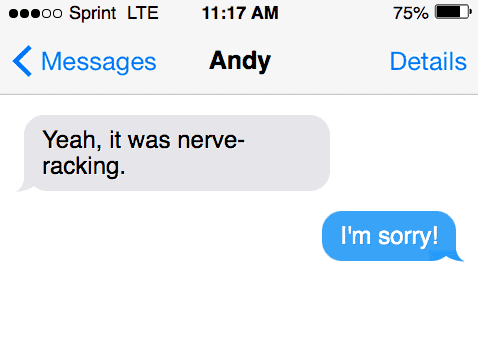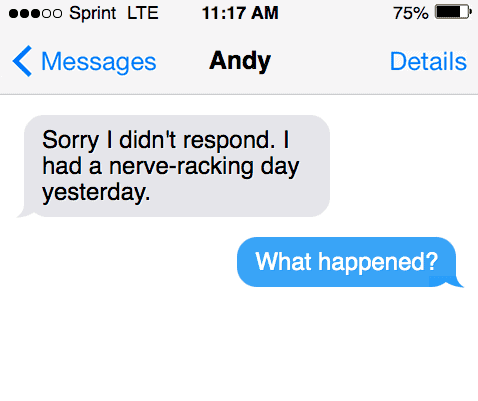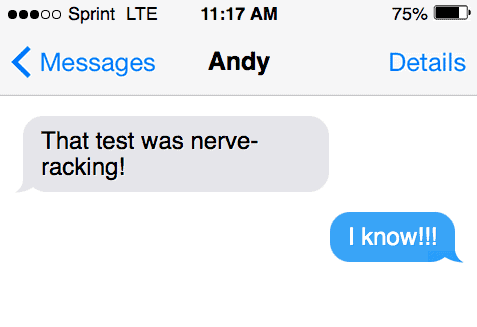Is it nerve wracking, nervewracking, or nerve-wracking? When desiring to say or write that something has a great deal of stress, we often use the phrase “nerve-wracking.” What is the correct way to spell this? The variations include: nerve-racking, nerve-wracking, nerve racking, nerve wracking, and so forth.
Learn how to write “nerve-racking” in proper American English…
How to use nerve-racking
Most commonly, nerve-racking is the correct way to describe a situation with a stressful emphasis. For example, “I couldn’t make it through the entire job interview. It was quite nerve-wracking.“
“Nerve-racking” is the more well-established variant spelling of the phrase that intends to allude to something that is anxiety-inducing.
Here’s another example, “It was a truly nerve-racking ordeal for me, it caused me a great deal of stress, and I don’t think I’ll be doing that again.”

Nerve-racking definition
Merriam Webster (reference) refers to “nerve-racking” as something that is extremely trying on the nerves.
Synonyms include:
- Agitating
- Anxious
- Distressful
- Distressing
- Disturbing
- Nail-biting
- Restless
Antonyms include:
- Calming
- Comfortable
- Easy
- Quiet
- Tranquil
Remember, antonyms mean the opposite of the phrase in question.
Examples
Here are examples of the phrase “nerve-racking” getting used in American English properly:
“It was a nerve-racking day for me. I was going to take the final test and didn’t feel prepared.”
“There was a nerve-racking noise coming from outside of the house. It prevented me from getting a good night’s rest.”
“My brain simply couldn’t let me sleep. The following day was going to be nerve-racking for me.”

Origins of “Rack”
“Rack” comes from a Middle Dutch word, recken, meaning “to stretch.”
I racked my brain and summoned up all the faces I could remember, but nowhere could I locate this man with the red hat. — L. Black & R. Lynd, Horlick’s Magazine, 1904
I wracked my brain, but I could not think of a sale we had ever made to him. — C. D. Crain, Jr., The Salesman, Aug., 1926
Nerve-wracking definition
Remember, the correct spelling is nerve-racking, not nerve-wracking. While both are accepted in American English and mean the same things—”nerve-racking” is preferred.
When to “wrack” my brain?
Wrack comes from the Middle English word for a shipwreck, wrak. “Wracked” can be seen in other phrases that refer to stress. “Wrack” is sometimes considered to be an archaic use of the phrases we commonly use.
This includes phrases like, “I wracked my brain.” And, “I’m feeling wracked with back pain.”

How to spell “nerve-racking” correctly
When writing “nerve-racking” and referring to something that is a great deal of stress, it is important to use “nerve-racking” with a dash between the two words, “nerve” and “racking.”
Correct grammar: nerve-racking.
Incorrect grammar: nerve racking.
“Rack” vs. “wrack”
To illustrate the difference between the two words, it’s crucial to remember their origins. “Wrack” comes from the idea that something is “storm-wracked.” Most commonly referred to as something that has wreckage.
What does it mean to “rack” something?
To rack something is to repeat in order. For example, a “rack of lamb” has multiple’s in an orderly fashion.
Phrases might include:
“A rack of lamb.” A cut of lamb perpendicular to the spine.
“To rack something up.” Or accumulate something.
What does it mean to “wrack” something?
To wrack something is commonly used to refer to something that is of ruin or destruction. The AP Stylebook refers to “wrack” as a noun that is “ruin or destruction.”
The 14th Century poem by Sir Gawain and the Green Knight sums up the British use of the word “wreck” well. Saying, “Werre and wrake (war and wrack) and wonder.”
Phrases might include:
“Wracked with pain.” Or something that is feeling destructive.
“Shipwrecked.” A boat that is suffering from ruin.
AP style guidelines for “nerve-racking”
Nerve-wracking and nerve-racking are alternative spellings of the same adjective. They are both referring to something that is stressful or anxiety-inducing. Nerve-racking is the preferred spelling method in both American and British English.
Although, what do the AP style guidelines say about “nerve-racking?”
The AP Stylebook refers to rack as a framework (noun); to arrange on a framework, torture, and torment (verb).
Oddly, AP Style accepts “nerve-wracking” in the way that “nerve-racking” is used. If writing in AP Style, use “nerve-wracking” instead of “nerve-racking.”
Alternatives to “nerve-racking”
Instead of saying something is nerve-racking, you can say:
It’s stressful. Simply saying, “stressful,” is another way to describe something as being the source of anxiety.
Sources
- What is an antonym? Definition and Examples | Opposite Words
- Antonym Definition & Meaning – Dictionary.com
- Rack vs. Wrack (Your Brain) – Merriam-Webster
- recken – Wiktionary
- Sir Gawain and the Green Knight
- Nerve-racking Definition & Meaning – Merriam-Webster
- Meaning of nerve-racking in English – Cambridge Dictionary
Inside this article
Fact checked:
Content is rigorously reviewed by a team of qualified and experienced fact checkers. Fact checkers review articles for factual accuracy, relevance, and timeliness. Learn more.
Core lessons
Glossary
- Abstract Noun
- Accusative Case
- Anecdote
- Antonym
- Active Sentence
- Adverb
- Adjective
- Allegory
- Alliteration
- Adjective Clause
- Adjective Phrase
- Ampersand
- Anastrophe
- Adverbial Clause
- Appositive Phrase
- Clause
- Compound Adjective
- Complex Sentence
- Compound Words
- Compound Predicate
- Common Noun
- Comparative Adjective
- Comparative and Superlative
- Compound Noun
- Compound Subject
- Compound Sentence
- Copular Verb
- Collective Noun
- Colloquialism
- Conciseness
- Consonance
- Conditional
- Concrete Noun
- Conjunction
- Conjugation
- Conditional Sentence
- Comma Splice
- Correlative Conjunction
- Coordinating Conjunction
- Coordinate Adjective
- Cumulative Adjective
- Dative Case
- Determiner
- Declarative Sentence
- Declarative Statement
- Direct Object Pronoun
- Direct Object
- Diction
- Diphthong
- Dangling Modifier
- Demonstrative Pronoun
- Demonstrative Adjective
- Direct Characterization
- Definite Article
- Doublespeak
- False Dilemma Fallacy
- Future Perfect Progressive
- Future Simple
- Future Perfect Continuous
- Future Perfect
- First Conditional
- Irregular Adjective
- Irregular Verb
- Imperative Sentence
- Indefinite Article
- Intransitive Verb
- Introductory Phrase
- Indefinite Pronoun
- Indirect Characterization
- Interrogative Sentence
- Intensive Pronoun
- Inanimate Object
- Indefinite Tense
- Infinitive Phrase
- Interjection
- Intensifier
- Infinitive
- Indicative Mood
- Participle
- Parallelism
- Prepositional Phrase
- Past Simple Tense
- Past Continuous Tense
- Past Perfect Tense
- Past Progressive Tense
- Present Simple Tense
- Present Perfect Tense
- Personal Pronoun
- Personification
- Persuasive Writing
- Parallel Structure
- Phrasal Verb
- Predicate Adjective
- Predicate Nominative
- Phonetic Language
- Plural Noun
- Punctuation
- Punctuation Marks
- Preposition
- Preposition of Place
- Parts of Speech
- Possessive Adjective
- Possessive Determiner
- Possessive Case
- Possessive Noun
- Proper Adjective
- Proper Noun
- Present Participle
- Prefix
- Predicate



